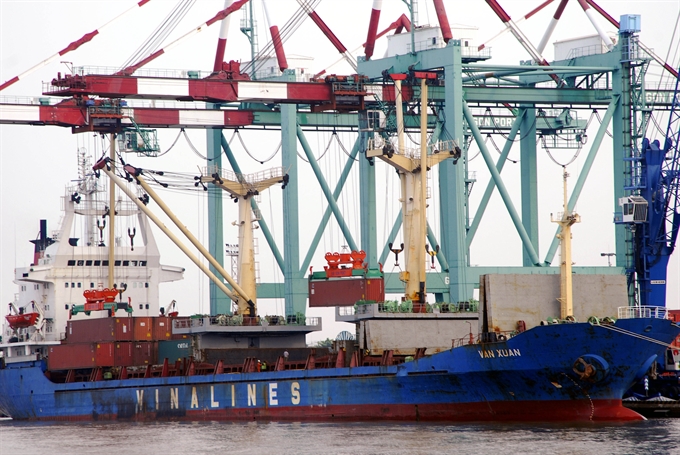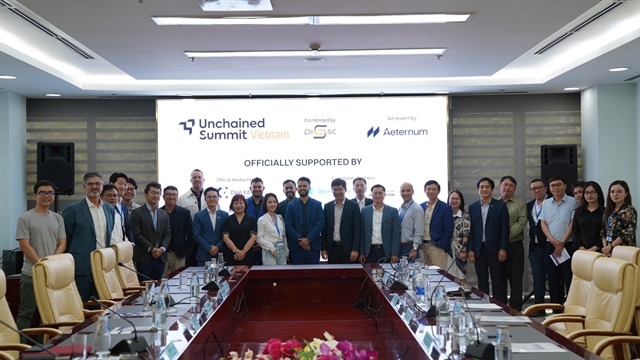 Economy
Economy

The HCM City People’s Committee signed a memorandum of understanding (MoU) to improve the domestic business environment and national competitiveness and increase education in HCM City.
 |
| Goods are loaded at Sài Gòn Port for export. Việt Nam is expected to make large gains as FDI increases. — VNA/VNS Photo Hoàng Hải |
HCM CITY — The HCM City People’s Committee signed a memorandum of understanding (MoU) to improve the domestic business environment and increase education on trade agreements such as the Trans-Pacific Partnership (TPP) yesterday in HCM City.
The MoU was also signed by the Việt Nam Chamber of Commerce and Industry (VCCI) and the American Chamber of Commerce in Việt Nam, representing the Việt Nam Trade Facilitation Alliance (VTFA).
Under the MoU, the VCCI will support the city in organising research, surveying the business environment, consulting on administrative reform, helping with business start-ups, and enhancing corporate governance capacity and the competitiveness of small- and medium-sized enterprises.
The VCCI will offer training courses, conferences, seminars, workshops and trade networking.
The VTFA and VCCI will also work with authorities to organise training courses on market research; support enterprises in e-commerce development; and promote technological application, innovation, brand building and trade promotion.
“We would like to collect all support policies and programmes from local authorities that create trade benefits for the local business community. From such policies, one action plan should be established to effectively support enterprises,” Võ Tân Thành, director of the VCCI – HCM City branch, said.
Herb Cochran, executive director of AmCham Việt Nam, said "The event aims to help Vietnamese businesses and Government to understand more about the new FTAs in general and the WTO Trade Facilitation Agreement and the TPP in particular.”
In 2015, the Việt Nam Trade Facilitation Alliance was set up by AmCham in co-operation with VCCI to provide technical assistance to Việt Nam’s customs authorities and state management agencies, and information to the National Assembly and business associations.
The purpose of the VTFA is to support Việt Nam’s international integration through fulfillment of Việt Nam’s international trade and investment commitments, with a special emphasis on implementation of the WTO Trade Facilitation Agreement in Việt Nam - as well as FTAs with similar provisions.
In addition, VTFA provides support to Vietnamese businesses to help them join global supply chains and inform them about the requirements needed in order to do so.
Nestor Scherbey, a VTFA senior advisor, pointed out that free trade is not really “free”.
“It will take a significant investment of time, effort, specialist expertise and dedicated resources for state agencies, companies and traders to successfully implement the benefits of the TPP, the EVFTA and other free trade agreements with respect to their goods,” he said.
“Tariff engineering” of goods for preferential tariff eligibility under these trade agreements requires details on products, processing and materials analysis to determine their status under each agreement’s specific rules.
Companies and traders will have to assess the impacts of these agreements on their global supply chains, step up their visibility for multiple tiers of suppliers who, through lack of management and oversight of supplier relationships, might create difficulties.
Scherbey suggested that at the provincial level, local authorities should establish a trade information database of FDI companies and domestic suppliers, for the purpose of identifying specific opportunities for Vietnamese companies that aim to become suppliers to FDI companies.
With help from technical experts, they will conduct surveys of FDI companies to identify the materials and intermediate goods Vietnamese producers can supply to FDI companies in order to produce export products to qualify for TPP and EVFTA preferential treatment.
“A Trade Information Centre will notify Vietnamese producers of the opportunities that have been identified, as well as provide TPP, EVFTA and other FTA trade information resources,” he added.
He said local authorities should sponsor and organise training courses and seminars for Vietnamese companies on global supply chains.
In addition, the New Trade Information Centre should conduct export marketing research on foreign technical standards and requirements for companies - especially SMEs.
“With the TPP, Vietnamese exports could reach US$307 billion by 2025, as opposed to $239 billion without the TPP,” Cochran of AmCham said.
Việt Nam is expected to reap large gains, as there would be more exports of manufacturers (34 per cent more), more imports of consumer and production goods (27 per cent), more inward FDI due to investor optimism, stronger links to international supply chains, productivity gains from competition, and momentum for reforms that boost growth and opportunity.
To support Vietnamese enterprises, the VTFA, VCCI, AmCham, the US Agency for International Development (USAID) and Việt Nam signed an MoU on customs-business partnerships and other customs procedures and standards, including mutual assistance agreements and the creation of a national committee on trade facilitation. — VNS




